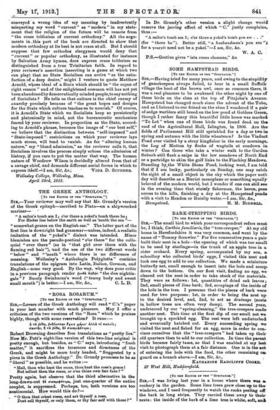" ROSA ROSARITM."
[To TEE EDITOR OF THE "SPECTATOR."]
Sta,—Lovers of the Greek Anthology will read " C.'s " paper in your last number with much pleasure. May I offer a criticism of the two versions of the "Rosa" which he praises highly, though with some reservation? It runs
1543a, ifoadecrcrety tots xciptv• lOula TI weacis;
ratrriv, h Ta Edda, hi erupaivporEpa ;
Robert Browning describes free translations as "pretty lies." Now Mr. Pott's eight-line version of this two-line original is pretty enough, but besides, as " C." says, introducing " fresh matter," it sacrifices the terseness and directness of the Greek, and might be more truly beaded, " Suggested by a piece in the Greek Anthology." Dr. Grundy promises to be as "literal" as possible, and he writes :— " Hail, thou who hast the roses, thou bast the rose's grace! But sellest thou the roses, or e'en thine own fair face ?"
Pretty again, but observe that the third alternative in the
long-drawn-out cruvamSkrEpa, just one-quarter of the entire
couplet, is suppressed. Perhaps, too, both versions are too sentimental. How would this do?- . " 0 thou that criest roses, and art thyself a rose, Dost sell thyself, or only them, or thy fair self with those ?"
In Dr. Grundy's other version a slight change would remove the jarring effect of which " C." justly complains, thus:—
"A sailor's tomb am I; o'er there a yokel's tomb you see . . ." (for " there be "). Better still, " a husbandman's you see "; for a weep-yds need not be a yokel."—I am, Sir, &c.
W. A. C.
P.S.—Grotius gives " ista roses clamans," &o.










































 Previous page
Previous page